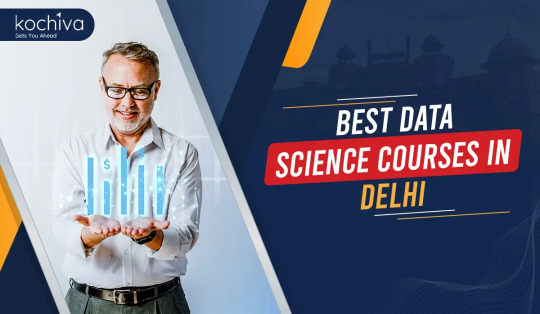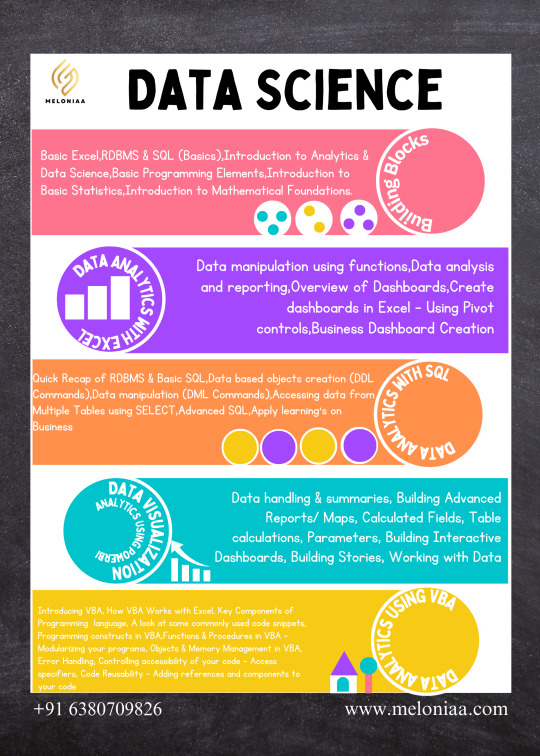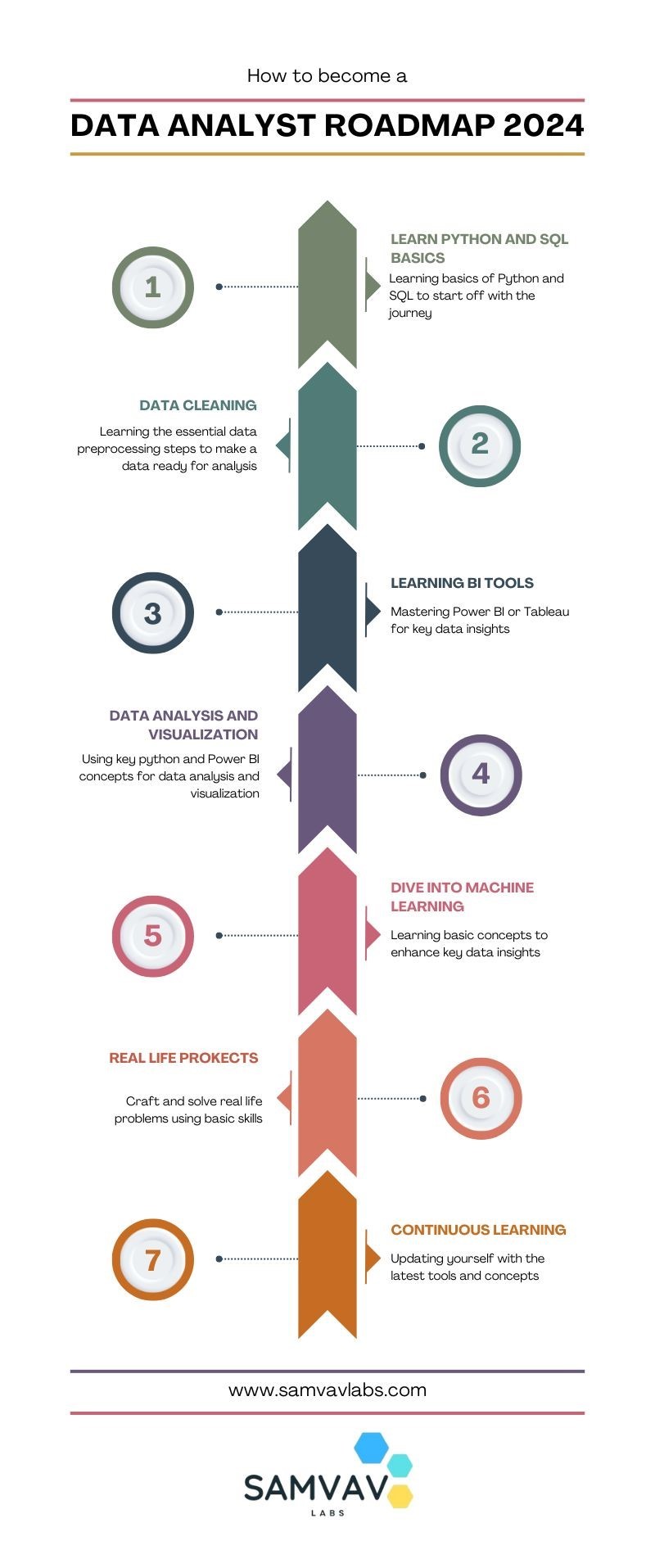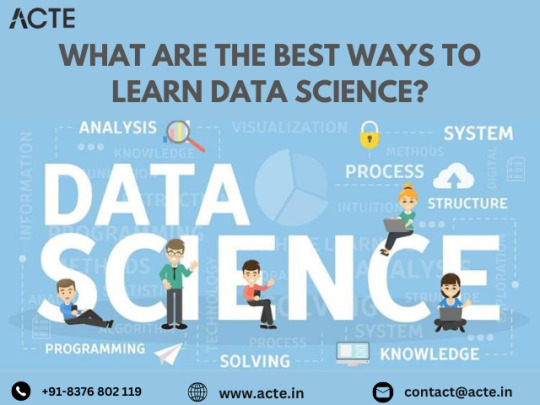#datascience course
Text
Choose a Career as a Data Analyst
The work of a data analyst has grown in importance across numerous businesses in today's data-driven society. If you're thinking about going into data analysis, you may be unsure if this is the right path for you. Let's examine what it takes to be a data analyst and see if this is the field that would best suit your goals for a career.

What Is Involved in Data Analysis?
Experts in data interpretation, analysis, and insight-gathering, data analysts support firms in making well-informed decisions. After gathering data from multiple sources, cleaning, and organizing it, they employ statistical methods and instruments to find patterns and trends.
Why Decide to Become a Data Analyst?
1. Great Demand: There is a strong need for data analysts in a variety of sectors, including technology, healthcare, retail, and finance. Because businesses use data to maximize performance, increase efficiency, and obtain a competitive edge, there is always a need for qualified analysts.
2. Variety of Opportunities: Data analysts can find employment in a range of sectors and occupations. There's probably a niche out there that suits your interests, whether they are in business intelligence, marketing analytics, or healthcare informatics.
3. Development of Analytical Skills: Working as a data analyst helps you enhance your analytical abilities. Working with complicated data sets, using software and analytical tools, and effectively communicating findings will all be covered.
4. Impactful Insights: Data analysts play a crucial role in shaping business strategies and outcomes. Your work directly influences decision-making processes, making your insights invaluable to organizations.

Things to Remember
Although a job in data analysis has many advantages, there are a few things to think about:
Technical Skills: It's frequently necessary to be proficient with programs like Excel, SQL, Python, or R. It's crucial to keep up with technology developments and engage in ongoing learning.
Precision and attention to detail are necessary when working with data to guarantee accuracy in analysis and interpretation.
Communication Skills: It's critical to effectively convey complicated findings to stakeholders who aren't technical. Good communication skills, both written and vocal, are advantageous.
Problem-Solving Mentality: Data analysts frequently take on challenging issues. Critical thinking skills and a problem-solving mentality are important qualities.If you enjoy working in a dynamic, fast-paced workplace, have an aptitude for statistics, and enjoy extracting insights from data, then being a data analyst can be a satisfying career choice.
You may have a big effect in any field you choose to work in if you have the necessary abilities and attitude. Examine your interests and strengths, think about the opportunities that are out there, and choose a course of action that will help you achieve your professional objectives. Perhaps a job in data analysis is the best route to success in the future.
0 notes
Text
#back end web development course#datascience course#machine learning#data analytics#business intelligence#language processing
0 notes
Text
Why Study Data Science?

Data science is an exciting and rewarding field that offers numerous compelling reasons to pursue it as a career path. Here are five key reasons why you should consider studying data science:
High Demand and Lucrative Salaries: With companies across industries recognizing the value of data-driven decision-making, the demand for skilled data scientists is skyrocketing, leading to abundant job opportunities and attractive compensation packages.
Work on Cutting-Edge Technologies: Data science lies at the intersection of emerging technologies like AI, machine learning, big data, and cloud computing, allowing you to work with cutting-edge tools and drive innovation.
Solve Complex Problems and Make an Impact: As a data scientist, you'll tackle real-world challenges across diverse domains, using data to develop solutions that can improve lives, drive social change, and shape the future.
Develop Highly Transferable Skills: Data science requires a unique combination of technical and analytical skills, such as programming, statistics, machine learning, and data visualization, which are highly transferable across industries and job roles.
Join a Vibrant Community: The data science community is diverse, dynamic, and collaborative, offering opportunities for continuous learning, networking, and professional growth through conferences, hackathons, and engagement with like-minded individuals.
With its high demand, potential for innovation, and the ability to make a meaningful impact, data science offers a rewarding and future-proof career path for those driven by intellectual curiosity and a passion for solving complex problems.
If you're in Delhi and looking to kickstart your data science journey, there are several excellent courses to consider, check out - Top 6 Best Data Science Courses in Delhi – The Complete Information
#kochivacourses#onlineclasses#online courses#datascience#data scientist#data science course#data scraping
14 notes
·
View notes
Text
What are some challenging concepts for beginners learning data science, such as statistics and machine learning?
Hi,
For beginners in data science, several concepts can be challenging due to their complexity and depth.
Here are some of the most common challenging concepts in statistics and machine learning:

Statistics:
Probability Distributions: Understanding different probability distributions (e.g., normal, binomial, Poisson) and their properties can be difficult. Knowing when and how to apply each distribution requires a deep understanding of their characteristics and applications.
Hypothesis Testing: Hypothesis testing involves formulating null and alternative hypotheses, selecting appropriate tests (e.g., t-tests, chi-square tests), and interpreting p-values. The concepts of statistical significance and Type I/Type II errors can be complex and require careful consideration.
Confidence Intervals: Calculating and interpreting confidence intervals for estimates involves understanding the trade-offs between precision and reliability. Beginners often struggle with the concept of confidence intervals and their implications for statistical inference.
Regression Analysis: Multiple regression analysis, including understanding coefficients, multicollinearity, and model assumptions, can be challenging. Interpreting regression results and diagnosing issues such as heteroscedasticity and autocorrelation require a solid grasp of statistical principles.
Machine Learning:
Bias-Variance Tradeoff: Balancing bias and variance to achieve a model that generalizes well to new data can be challenging. Understanding overfitting and underfitting, and how to use techniques like cross-validation to address these issues, requires careful analysis.
Feature Selection and Engineering: Selecting the most relevant features and engineering new ones can significantly impact model performance. Beginners often find it challenging to determine which features are important and how to transform raw data into useful features.
Algorithm Selection and Tuning: Choosing the appropriate machine learning algorithm for a given problem and tuning its hyperparameters can be complex. Each algorithm has its own strengths, limitations, and parameters that need to be optimized.
Model Evaluation Metrics: Understanding and selecting the right evaluation metrics (e.g., accuracy, precision, recall, F1 score) for different types of models and problems can be challenging.
Advanced Topics:
Deep Learning: Concepts such as neural networks, activation functions, backpropagation, and hyperparameter tuning in deep learning can be intricate. Understanding how deep learning models work and how to optimize them requires a solid foundation in both theoretical and practical aspects.
Dimensionality Reduction: Techniques like Principal Component Analysis (PCA) and t-Distributed Stochastic Neighbor Embedding (t-SNE) for reducing the number of features while retaining essential information can be difficult to grasp and apply effectively.
To overcome these challenges, beginners should focus on building a strong foundation in fundamental concepts through practical exercises, online courses, and hands-on projects. Seeking clarification from mentors or peers and engaging in data science communities can also provide valuable support and insights.
#bootcamp#data science course#datascience#data analytics#machinelearning#big data#ai#data privacy#python
3 notes
·
View notes
Text

🚀 Ready to become a Data Science pro? Join our comprehensive Data Science Course and unlock the power of data! 📊💡
🔍 Learn:
Excel
PowerBi
Python & R
Machine Learning
Data Visualization
Real-world Projects
👨🏫 Taught by industry experts
💼 Career support & networking
3 notes
·
View notes
Text

Data Analyst Roadmap for 2024!
Cracking the Data Analyst Roadmap for 2024! Kick off your journey by mastering and delving into Python for data manipulation magic, and dazzle stakeholders with insights using PowerBi or Tableau. Don't forget, that SQL proficiency and hands-on projects refine your skillset, but never overlook the importance of effective communication and problem-solving. Are you checking off these milestones on your path to success? 📌 For more details, visit our website: https://www.samvavlabs.com
.
.
.
#DataAnalyst2024 #CareerGrowth #roadmap #DataAnalyst #samvavlabs #roadmap2024 #dataanalystroadmap #datavisualization
#business analytics#data analytics#data analyst#machinelearning#data visualization#datascience#deep learning#data analyst training#dataanalystcourseinKolkata#data analyst certification#data analyst course#data science course#business analyst
3 notes
·
View notes
Text
Certify Your Career: Data Science Course with Placement Guarantee in Pune
Explore the Data Science Course by Yess Infotech in Pune, offering a comprehensive curriculum, hands-on learning, expert faculty, and assured placement opportunities. Prepare for a successful career in data science amidst Pune's thriving tech ecosystem.
Conclusion: With Yess Infotech's Data Science Course, you gain more than just knowledge; you gain the confidence and assurance of placement in Pune's dynamic job market. Take the first step towards a rewarding career in data science today!

#marketing#programming#success#software#data analytics#data analysis#full stack course#datascience#python#english literature
3 notes
·
View notes
Text
Best Data Science Courses Online - Skillsquad
Why is data science important?
Information science is significant on the grounds that it consolidates instruments, techniques, and innovation to create importance from information. Current associations are immersed with information; there is a multiplication of gadgets that can naturally gather and store data. Online frameworks and installment gateways catch more information in the fields of web based business, medication, finance, and each and every part of human existence. We have text, sound, video, and picture information accessible in huge amounts.
Best future of data science with Skillsquad
Man-made consciousness and AI advancements have made information handling quicker and more effective. Industry request has made a biological system of courses, degrees, and occupation positions inside the field of information science. As a result of the cross-practical range of abilities and skill required, information science shows solid extended development throughout the next few decades.
What is data science used for?
Data science is used in four main ways:
1. Descriptive analysis
2. Diagnostic analysis
3. Predictive analysis
4. Prescriptive analysis
1. Descriptive analysis: -
Distinct examination looks at information to acquire experiences into what occurred or what's going on in the information climate. It is portrayed by information representations, for example, pie diagrams, bar outlines, line charts, tables, or created accounts. For instance, a flight booking administration might record information like the quantity of tickets booked every day. Graphic investigation will uncover booking spikes, booking ruts, and high-performing a very long time for this help.
2. Diagnostic analysis: -
Symptomatic investigation is a profound plunge or point by point information assessment to comprehend the reason why something occurred. It is portrayed by procedures, for example, drill-down, information revelation, information mining, and connections. Different information tasks and changes might be performed on a given informational index to find extraordinary examples in every one of these methods.
3. Predictive analysis: -
Prescient examination utilizes authentic information to make precise gauges about information designs that might happen from here on out. It is portrayed by procedures, for example, AI, determining, design coordinating, and prescient displaying. In every one of these procedures, PCs are prepared to figure out causality associations in the information
4. Prescriptive analysis: -
Prescriptive examination takes prescient information to a higher level. It predicts what is probably going to occur as well as proposes an ideal reaction to that result. It can investigate the likely ramifications of various decisions and suggest the best strategy. It utilizes chart investigation, reproduction, complex occasion handling, brain organizations, and suggestion motors from AI.
Different data science technologies: -
Information science experts work with complex advancements, for example,
- Computerized reasoning: AI models and related programming are utilized for prescient and prescriptive investigation.
- Distributed computing: Cloud innovations have given information researchers the adaptability and handling power expected for cutting edge information investigation.
- Web of things: IoT alludes to different gadgets that can consequently associate with the web. These gadgets gather information for information science drives. They create gigantic information which can be utilized for information mining and information extraction.
- Quantum figuring: Quantum PCs can perform complex estimations at high velocity. Gifted information researchers use them for building complex quantitative calculations.
We are providing the Best Data Science Courses Online
AWS Certification Program
Full Stack Java Developer Training Courses
2 notes
·
View notes
Text
Top-Ranked SAP Training Institutes in Amravati | SAPALOGY

Why Choose Amravati for SAP Training?
Opting for SAP training in Amravati presents a compelling choice for several reasons. The city's burgeoning industrial presence and dynamic economic landscape make it an ideal location for professionals seeking to enhance their skills in SAP (Systems, Applications, and Products in Data Processing). Here are key considerations that make Amravati a favorable destination for SAP training:
Growing Industrial Hub: Amravati has experienced substantial industrial growth, establishing itself as a notable hub for various sectors. This growth translates into a wealth of opportunities for SAP professionals, as businesses increasingly integrate SAP solutions to streamline their operations.
Vibrant Economic Environment: The city boasts a vibrant economic environment, with diverse industries contributing to its economic prosperity. This diversity ensures that SAP professionals trained in Amravati gain exposure to a broad spectrum of real-world business scenarios, enhancing their practical skills.
Rising Demand for SAP Experts: As businesses in Amravati continue to recognize the efficiency and effectiveness of SAP, there is a heightened demand for skilled SAP professionals. Choosing to undergo SAP training in Amravati positions individuals at the forefront of this demand, increasing their employability and career prospects.
Networking Opportunities: Amravati's status as an emerging business hub provides ample networking opportunities. SAP training institutes often collaborate with local businesses, offering students valuable connections with industry professionals. This networking can prove instrumental in securing internships, projects, and job placements.
Cost-Effective Training Options: Compared to larger metropolitan areas, the cost of living and training in Amravati tends to be more affordable. This cost-effectiveness extends to SAP training programs, making it an attractive choice for individuals seeking quality education without an exorbitant financial burden.
Quality Training Institutes: Amravati is home to reputable SAP training institutes that prioritize quality education. These institutes often tailor their programs to meet the specific needs of the local industry, ensuring that graduates are well-equipped to navigate the challenges of the regional business landscape.
Cultural and Regional Relevance: Training in Amravati provides a unique advantage of cultural and regional relevance. Understanding the local business culture and practices can be advantageous when applying SAP skills in the context of businesses operating in and around Amravati.
In conclusion, choosing SAP training in Amravati aligns with the city's economic dynamism, rising demand for SAP professionals, networking opportunities, cost-effectiveness, presence of quality training institutes, and cultural relevance. Aspiring SAP professionals can capitalize on these factors to receive comprehensive training and position themselves for success in the competitive job market.
To know more-
2 notes
·
View notes
Text
🚀 Ready to take your skills to the next level? Check out this fantastic video on free AI courses with certification. 🤖
Follow me on LinkedIn: https://www.linkedin.com/in/gomathisri/
Follow me on YouTube Channel: https://www.youtube.com/@gomstechtalks?sub_confirmation=1
Follow me on Twitter: https://twitter.com/GomsTechtalks
In a rapidly evolving world, staying current with the latest technologies is essential. This video explores an array of free AI courses that offer certification upon completion. Whether you're an aspiring AI professional or just curious about the field, these resources can be a game-changer for your career.
📌 Key Takeaways:
👉Discover a variety of AI courses, from introductory to advanced.
👉Get insights into the skills you'll gain and the industry benefits.
Invest in yourself and open doors to exciting opportunities. Don't miss out on this valuable resource!
youtube
AI Free courses with certificate
#artificial intelligence#free courses#gomstechtalks#aifreecourses#datascience#machine learning#python#trending#Youtube
1 note
·
View note
Text
A Beginner's Guide to Data Science Education: Essential Readings
In order to derive valuable insights from data, the quickly developing area of data science integrates statistical analysis, programming, and domain knowledge. These are some must-read books to help you on your data science journey, regardless of experience level or desire to learn more.

Start with works like Wes McKinney's "Python for Data Analysis" and Gareth James et al.'s "Introduction to Statistical Learning" to lay a solid foundation. Important topics like data manipulation, exploratory data analysis (EDA), and fundamental machine learning techniques are covered in these works. They use Python, a widely used language in data science, to give real-world examples that are easy for beginners to understand.
2. Getting the Hang of Machine Learning
"Hands-On Machine Learning with Scikit-Learn, Keras, and TensorFlow" by Aurélien Géron will take you on a deeper exploration of machine learning. This book provides practical tasks to help you grasp the many machine learning techniques covered, ranging from deep neural networks to linear regression. It's perfect for anyone who want to use machine learning techniques to solve practical issues.
3. Telling Stories and Visualizing Data
In data science, effectively communicating insights is essential. Edward Tufte's classic "The Visual Display of Quantitative Information" delves into the fundamentals of data visualization. "Storytelling with Data" by Cole Nussbaumer Knaflic provides helpful advice on how to use visualizations to create engaging tales for data storytelling.
4. Specializations and Advanced Topics
As you advance, investigate more specific subjects such as time series analysis, deep learning, or natural language processing (NLP). NLP fans should read "Natural Language Processing with Python" by Steven Bird et al., while those interested in learning about advanced neural network designs should read "Deep Learning" by Ian Goodfellow et al.

Entering the field of data science demands commitment and never-ending education. These books are an excellent way to learn basic ideas, gain useful skills, and delve into more complex subjects. Recall that learning data science requires experimentation and practical experience. In this ever-evolving subject, start with foundational texts, work your way up to more complex topics based on your interests, and never stop being curious and flexible.
0 notes
Text

Lets empower yourself with knowledge!
Asti Academy is a UAE certified global digital learning platform which provides a wide range of courses in technology.
We provide various courses like SAP, Digital Marketing, Blockchain technology, Six Sigma, PMP, Data Science, Artificial Reality, IOT, ACCA, Crypto Trading.
Check out our online courses and learn something new today.
#online courses#students#courses#datascience#digitalmarketing#acca course#iot#blockchain#cryptotrading#six sigma certification#artificial intelligence#pmp online#pmp course
3 notes
·
View notes
Text
Is it possible to transition to a data scientist from a non-tech background at the age of 28?
Hi,
You can certainly shift to become a data scientist from a nontechnical background at 28. As a matter of fact, very many do. Most data scientists have actually shifted to this field from different academic and professional backgrounds, with some of them having changed careers even in their midlife years.

Build a Strong Foundation:
Devour some of the core knowledge about statistics, programming, and data analysis. Online classes, bootcamps—those are good and many, many convenient resources. Give it a whirl with Coursera and Lejhro for specific courses related to data science, machine learning and programming languages like Python and R.
A data scientist needs to be proficient in at least one or two programming languages. Python is the most used language for data science, for it is simple, and it has many libraries. R is another language that might come in handy for a data scientist, mostly in cases connected with statistical analysis. The study of manipulation libraries for study data and visualization tools includes Pandas for Python and Matplotlib and Seaborn for data, respectively.
Develop Analytical Skills:
The field of data science includes much analytics and statistics. Probability, hypothesis testing, regression analysis would be essential. These skills will help you derive meaningful information out of the data and also allow you to use statistical methods for real-world problems.
Practical experience is very important in the field of data science. In order to gain experience, one might work on personal projects or contribute to open-source projects in the same field. For instance, data analysis on publicly available datasets, machine learning, and creating models to solve particular problems, all these steps help to make the field more aware of skills with one's profile.
Though formal education in data science is by no means a requirement, earning a degree or certification in the discipline you are considering gives you great credibility. Many reputed universities and institutions offer courses on data science, machine learning, and analytics.
Connect with professionals in the same field: try to be part of communities around data science and attend events as well. You would be able to find these opportunities through networking and mentoring on platforms like LinkedIn, Kaggle, and local meetups. This will keep you abreast of the latest developments in this exciting area of research and help you land job opportunities while getting support.
Look out for entry-level job opportunities or internships in the field of data science; this, in effect, would be a great way to exercise your acquired experience so far. Such positions will easily expose one to a real-world problem related to data and allow seizing the occasion to develop practical skills. These might be entry-level positions, such as data analysts or junior data scientists, to begin with.
Stay Current with Industry Trends: Data science keeps on evolving with new techniques, tools, and technologies. Keep up to date with the latest trends and developments in the industry by reading blogs and research papers online and through courses.
Conclusion:
It is definitely possible to move into a data scientist role if one belongs to a non-tech profile and is eyeing this target at the age of 28. Proper approach in building the base of strong, relevant skills, gaining practical experience, and networking with industry professionals helps a lot in being successful in the transition. This is because data science as a field is more about skills and the ability to solve problems, which opens its doors to people from different backgrounds.
#bootcamp#data science course#datascience#python#big data#machinelearning#data analytics#ai#data privacy
3 notes
·
View notes
Text
Embarking on the Odyssey of Data Science Mastery: A Comprehensive 8-Step Guide
Navigating the dynamic waters of data science requires a combination of technical acumen and analytical finesse. This comprehensive guide unfolds an 8-step roadmap, not just to become a data scientist but to master the intricate art and science that defines this dynamic field.

1. Building a Sturdy Mathematical Foundation: The Pillars of Understanding
Embark on your journey with a laser focus on constructing a formidable foundation in fundamental mathematical principles, probability theory, and statistics. This foundational knowledge serves as the bedrock upon which you'll interpret data and seamlessly implement statistical models with precision.
2. Mastering Programming Languages: The Data Scientist's Linguistic Proficiency
In the vast toolkit of a data scientist, mastery in a programming language is key. Delve into the intricacies of Python or R, navigating the landscape of data manipulation libraries like Pandas or data.table. These tools become your allies in handling large datasets with finesse.
3. Navigating Data Analysis Libraries: Unleashing the Power of Manipulation
With programming proficiency comes the need to manipulate and analyze data efficiently. This is where libraries like Pandas (Python) and dplyr (R) shine. Pandas, known for its ease of use, provides data structures and functions needed to manipulate structured data seamlessly, while dplyr simplifies data manipulation in R.
4. Crafting Visual Narratives: The Art of Data Visualization
Transforming complex insights into compelling visual narratives is the hallmark of a skilled data scientist. Immerse yourself in the world of data visualization tools such as Matplotlib, Seaborn, or ggplot2. Through mastery of these tools, your analytical findings metamorphose into visually striking stories.

5. Navigating the Landscape of Machine Learning Basics: Algorithms as Your Guide
Machine learning (ML) is the heart of data science. Start with the basics – linear regression, logistic regression, and classification algorithms. Platforms like Scikit-Learn (Python) and caret (R) provide practical implementations. A solid grasp of the fundamentals empowers you to tackle a myriad of real-world problems.
6. Bridging Theory and Practice: The Power of Hands-On Projects
Theoretical knowledge gains potency when applied. Platforms like Kaggle provide datasets and competitions, allowing you to test your skills in a real-world context. Building a portfolio of projects showcases your skills to potential employers and collaborators.
7. Structured Learning Paths: The Guiding Compass of Online Courses
The world of data science is vast, and structured courses can act as your compass. Platforms like Coursera, edX, and Udacity offer courses tailored to various aspects of data science. These courses provide not just theoretical knowledge but hands-on experience, ensuring a well-rounded education.
8. Learning Together: The Vibrant Tapestry of Community Engagement
Data science is not a solitary pursuit. Engage with the community. Platforms like Stack Overflow, Reddit (r/datascience), and GitHub offer spaces to ask questions, share insights, and learn from experienced practitioners. Actively participating in the data science community exposes you to the latest trends, tools, and best practices.
Conclusion: A Journey of Continuous Discovery Embarking on the data science odyssey is not a sprint; it's a marathon of continuous learning. Each step in this guide is a stepping stone, guiding you through the intricate landscape of data science. As you navigate through the sea of data, may your curiosity be your compass, and may the insights you unearth become beacons of knowledge in the vast realm of data science. Best of luck on your journey!
#data science course#datascience#technology#data science certification#data science training#tech#education
4 notes
·
View notes
Text
Introduction to Feature Selection: How to Improve Model Accuracy
Feature selection is key in machine learning, helping identify the most relevant features from a dataset. Irrelevant or redundant data can add complexity, impacting model accuracy. By applying these techniques, you can streamline your model and reduce overfitting. Read more to know how it improves efficiency and accuracy.
0 notes
Text
Master Data Analytics: Navigate Insights with Yess InfoTech
Discover data analytics at Yess InfoTech. Our course covers descriptive, predictive, and prescriptive analytics, decoding trends for informed decisions. Explore real-time analytics, prioritizing ethics in data handling.
Conclusion:
In today's digital era, Yess InfoTech offers a transformative data analytics course. Decode trends, predict outcomes, and prioritize ethics in decision-making. Join us to unlock the power of data and navigate the digital landscape confidently.

#marketing#programming#success#software#data analytics#data analysis#datascience#full stack course#python
2 notes
·
View notes